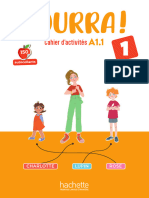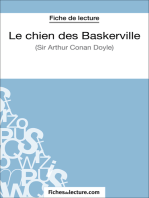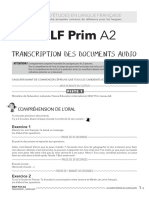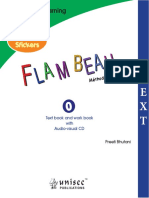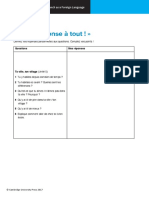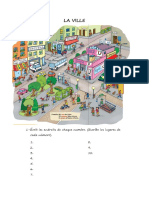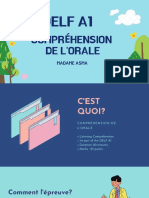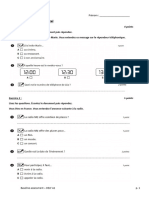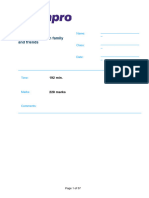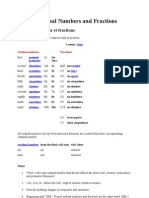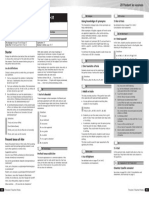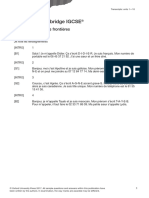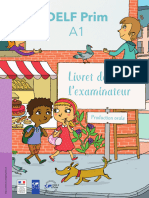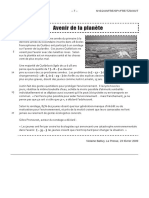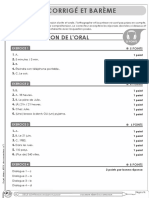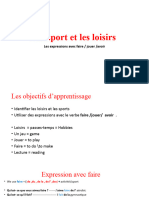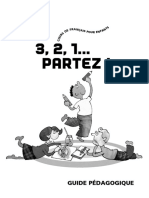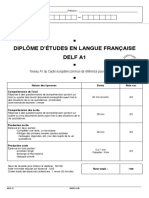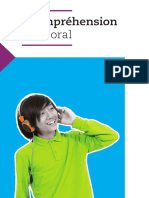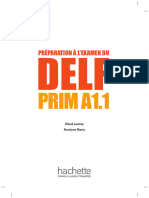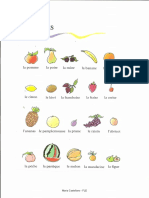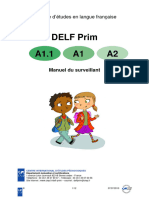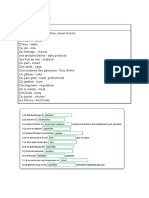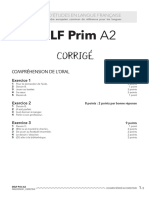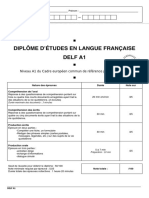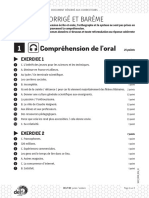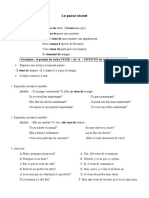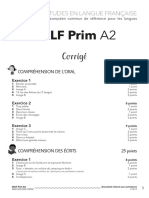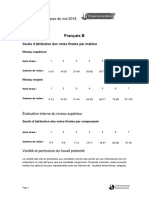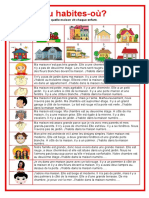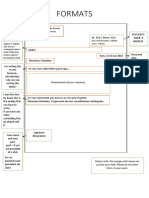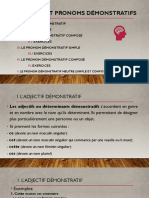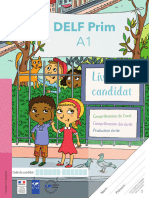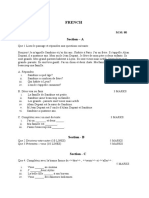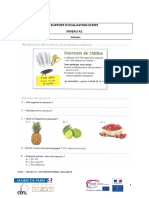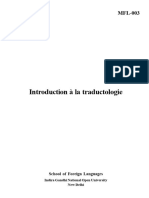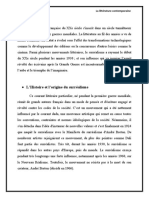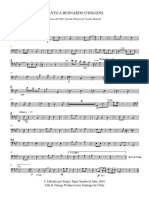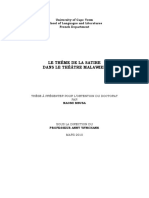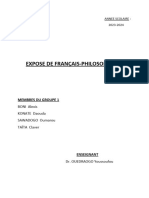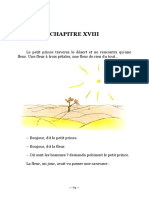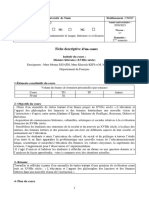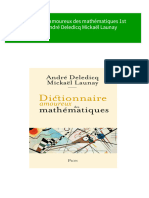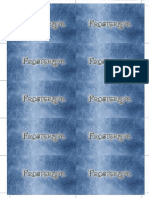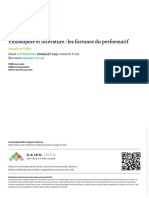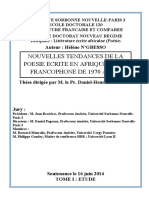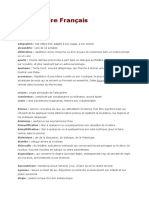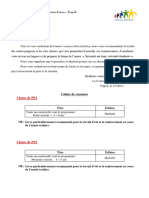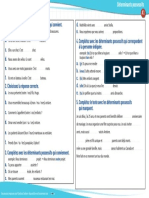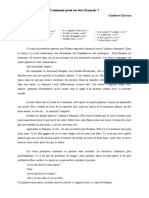Tricolore 2 (5e Edition) - Unit 4-6
Tricolore 2 (5e Edition) - Unit 4-6
Transféré par
TSV GamingDroits d'auteur :
Formats disponibles
Tricolore 2 (5e Edition) - Unit 4-6
Tricolore 2 (5e Edition) - Unit 4-6
Transféré par
TSV GamingCopyright
Formats disponibles
Partager ce document
Partager ou intégrer le document
Avez-vous trouvé ce document utile ?
Ce contenu est-il inapproprié ?
Droits d'auteur :
Formats disponibles
Tricolore 2 (5e Edition) - Unit 4-6
Tricolore 2 (5e Edition) - Unit 4-6
Transféré par
TSV GamingDroits d'auteur :
Formats disponibles
UNITÉS 4-6 Most irregular French verbs have irregular past participles:
Vocabularyd (to have) avoir eu
(to drink) boire bu
Family Household chores Food/ Menus At the railway station (to read) lire lu
(pg. 69) (pg. 69) (pg. 85) (pg. 101) (can/ to be able to) pouvoir pu
(to see) voir vu
(to know-how) savoir su
The Perfect Tense (Passé Composé)d (to be acquainted with) connaître connu
(to want) vouloir voulu
avoir verbs (to say) dire dit
(to write) écrire écrit
subject + present tense conjugation + past participle (to put/ put on) mettre mis
of avoir (participe passé) (to take) prendre pris
(to be) être été
Nous avons mangé. (to do/ make) faire fait
(We have eaten) (to discover) découvrir découvert
(We ate)
Passé Composé in Negative Form
Conjugation of avoir
In negative form, the ne and pas/ plus, etc. are written before and after the
J’ai Il a Nous avons Ils ont verb and not the past participle.
Tu as Elle a Vous avez Elles ont
On a Tu n’ as pas étudié pour l’examen.
(You didn't study/ haven't studied for the exam)
Formation of Past Participles
Passé Composé in Interrogative Form
The past participles of regular verbs:
When you write questions in the past, the following changes can take
-er verbs place.
(to talk) parler > parler > parlé
Est-ce que tu as étudié ? (Did you study?)
-ir verbs Tu as étudié? (Have you studied?)
(to succeed) réussir > réussir > réussi As-tu étudié?
-re verbs Qu'est-ce que tu as étudié ? (What did you study?)
(to sell) vendre > vendre > vendu
A-t-il étudié, ton ami? (Did your friend study?)
être verbs Rules to remember!
subject + present tense conjugation + past participle 1. For all verbs conjugated with être, the past participle must agree with the
of être (participe passé) subject in gender and number:
Je suis entré la chambre. Il est allé. (He went) Elle est allée. (She went)
(I has entered the room) Ils sont allés. (They went) Elles sont allées. (They went)
(I entered the room)
2. In addition to the above, all reflexive verbs use être as the auxiliary verb:
Conjugation of être
Je me suis levé. (I got up)
Je suis Il est Nous sommes Ils sont Elle s'est habillée. (She got dressed)
Tu es Elle est Vous êtes Elles sont
On est
Adverbs of past timed
The following is a list of verbs that require être. Meet Dr. & Mrs. Vandetramp!
l'année dernière last year
Devenir > devenu (to become) le mois dernier last month
Revenir > revenu (to come back) la semaine dernière last week
le weekend dernier last weekend
& (vendredi) dernier last (Friday)
récemment recently
Monter > monté (to climb)
avant-hier the day before yesterday
Rester > resté (to stay)
hier yesterday
Sortir > sorti (to go out) hier (soir) yesterday (night)
ce matin this morning
Venir > venu (to come)
Aller > allé (to go)
Naître > né (to be born) Demonstrative Adjectivesd
Descendre > descendu (to go down)
masculine masculine singular/ masculine/
Entrer > entré (to enter) feminine singular
singular starting with vowels feminine plural
Tomber > tombé (to fall) ce cet cette ces
Retourner > retourné (to return/ go back) ce garçon cet ordinateur cette fille ces enfants
Arriver > arrivé (to arrive) this boy this computer this girl these children
Mourir > mort (to die)
Partir > parti (to leave)
Vous aimerez peut-être aussi
- Stephen King - SalemDocument670 pagesStephen King - SalemIlies chr57% (7)
- Rougemont - Denis de L - Amour Et L - OccidentDocument242 pagesRougemont - Denis de L - Amour Et L - Occidentjeison Patiño100% (4)
- Hourra Ca ExtraitDocument18 pagesHourra Ca ExtraitMercedes BabinoPas encore d'évaluation
- Le chien des Baskerville d'Arthur Conan Doyle (Fiche de lecture): Analyse complète de l'oeuvreD'EverandLe chien des Baskerville d'Arthur Conan Doyle (Fiche de lecture): Analyse complète de l'oeuvrePas encore d'évaluation
- Tailles Des Socles Version 8Document19 pagesTailles Des Socles Version 8marko bastPas encore d'évaluation
- French Ab Initio Paper 1 SL Markscheme FrenchDocument16 pagesFrench Ab Initio Paper 1 SL Markscheme FrenchSky RocketPas encore d'évaluation
- Delf Prim A2 Transcription 220715 012314Document3 pagesDelf Prim A2 Transcription 220715 012314Nour AhmedPas encore d'évaluation
- Flambeau 0 - Smart Board - CH 9-12-UnlockedDocument11 pagesFlambeau 0 - Smart Board - CH 9-12-UnlockedDavid julian100% (2)
- Je joue avec les mots, 4e année: Édition revue et corrigéeD'EverandJe joue avec les mots, 4e année: Édition revue et corrigéePas encore d'évaluation
- Cambridge IGCSE French Worksheet R3.01Document5 pagesCambridge IGCSE French Worksheet R3.01Rajiv KhannaPas encore d'évaluation
- La VilleDocument5 pagesLa VilleLeandro Lisowiec SonclairePas encore d'évaluation
- Exemple de Livret Surveillant DELF Prim A2Document4 pagesExemple de Livret Surveillant DELF Prim A2Michael LafetPas encore d'évaluation
- Widget Merci CompletDocument12 pagesWidget Merci CompletMessaouda BoumelitaPas encore d'évaluation
- Cherche Un Manteau: M. LavigneDocument7 pagesCherche Un Manteau: M. LavigneVedanti DesaiPas encore d'évaluation
- Delf A1 Presentation CoDocument14 pagesDelf A1 Presentation Co‘ain zubaidahPas encore d'évaluation
- Test de Placement FLE de Niveau A1Document10 pagesTest de Placement FLE de Niveau A1Clément LuPas encore d'évaluation
- Relationships With Family and FriendsDocument57 pagesRelationships With Family and Friendsrite2shinjiniPas encore d'évaluation
- French Ordinal Numbers and FractionsDocument1 pageFrench Ordinal Numbers and Fractionsdiah_mulcil06100% (2)
- Tricolore-KS3-5e-3-Teacher Book-Pp44-45Document1 pageTricolore-KS3-5e-3-Teacher Book-Pp44-45Kareem NasserPas encore d'évaluation
- Tricolore Student Book 4 - Units1-10 - TranscriptsDocument23 pagesTricolore Student Book 4 - Units1-10 - TranscriptsShaminaPas encore d'évaluation
- Livret Examinateur 2 Delf Prim A1Document16 pagesLivret Examinateur 2 Delf Prim A1sayed.elbitarPas encore d'évaluation
- Partage de La Planète Ab - Avenir de La PlanèteDocument3 pagesPartage de La Planète Ab - Avenir de La PlanèteVinti PoddarPas encore d'évaluation
- 2020nov Ms French Ab InitioDocument7 pages2020nov Ms French Ab InitioDanielPas encore d'évaluation
- Delf Dalf A2 SJ Correcteur Sujet DemoDocument2 pagesDelf Dalf A2 SJ Correcteur Sujet DemoKristin LafééPas encore d'évaluation
- Les Sport Et Les LoisirsDocument6 pagesLes Sport Et Les LoisirskarthiksraghavPas encore d'évaluation
- Livret Surveillant Delf Prim A2Document5 pagesLivret Surveillant Delf Prim A2faragdianaPas encore d'évaluation
- Tricolore Manuel de Français Réponses PDFDocument7 pagesTricolore Manuel de Français Réponses PDFScribdTranslations0% (1)
- 321partez TBK IntroDocument14 pages321partez TBK IntroMane SialerPas encore d'évaluation
- Delf Exemple A1 CompressDocument23 pagesDelf Exemple A1 Compress2024 Ens DIAZ GOMEZ KARLA CORINAPas encore d'évaluation
- DELF Scolaire Et Junior Reussite 1870 11 24Document14 pagesDELF Scolaire Et Junior Reussite 1870 11 24Erick PerezPas encore d'évaluation
- Catalog of Le 2015Document36 pagesCatalog of Le 2015mask2014Pas encore d'évaluation
- DELF PRIM A2 Session 2001 Samedi Soir (Séance 10) Avec CorrectionDocument14 pagesDELF PRIM A2 Session 2001 Samedi Soir (Séance 10) Avec CorrectionDeboraPas encore d'évaluation
- Manuel Candidat Delf Prim A2Document3 pagesManuel Candidat Delf Prim A2Manel ManuillaaPas encore d'évaluation
- Adomania 1 Livre de L'eleve Étape 0Document3 pagesAdomania 1 Livre de L'eleve Étape 0Gri shaPas encore d'évaluation
- 16 Les Fruits PDFDocument7 pages16 Les Fruits PDFSandro LuzPas encore d'évaluation
- Manuel SurveillantDocument13 pagesManuel SurveillantNadir ProPas encore d'évaluation
- IGCSE French NotesDocument18 pagesIGCSE French NotesSchmidt JakePas encore d'évaluation
- Delf Prim A2 Corrige - 220715 - 012357Document2 pagesDelf Prim A2 Corrige - 220715 - 012357Nour AhmedPas encore d'évaluation
- Microsoft Word - DELF - A1 - Ex2.doc - Exemple-2-Sujet-Complet-Delf-A1-Tous-Publics-3Document24 pagesMicrosoft Word - DELF - A1 - Ex2.doc - Exemple-2-Sujet-Complet-Delf-A1-Tous-Publics-3Milena GomesPas encore d'évaluation
- Compréhension Écrite Marie-AntoinetteDocument1 pageCompréhension Écrite Marie-AntoinetteMademoiselle FLEPas encore d'évaluation
- Delf Dalf b2 SJ Correcteur Sujet DemoDocument2 pagesDelf Dalf b2 SJ Correcteur Sujet DemoManuel Gonzalez GalvezPas encore d'évaluation
- Le Passé RécentDocument1 pageLe Passé RécentLaura BicaPas encore d'évaluation
- Delf b1 TP Candidat Coll Exemple1Document12 pagesDelf b1 TP Candidat Coll Exemple1Мария ЖеребнаяPas encore d'évaluation
- Delf Prim A2 CorrigeDocument2 pagesDelf Prim A2 CorrigeAnjaraniaina Maherifanasina A100% (3)
- French Oral Notes IBDocument4 pagesFrench Oral Notes IBAfrazPas encore d'évaluation
- Exercices Preparacion Delf Prim A2 Mayo - 1-10Document10 pagesExercices Preparacion Delf Prim A2 Mayo - 1-10Adrián González AlonsoPas encore d'évaluation
- French B Subject Report 2018Document30 pagesFrench B Subject Report 2018salmasomaPas encore d'évaluation
- Maison Tu Habites Ou Comprehension Ecrite Texte Questions Unaun Mentora - 140864Document1 pageMaison Tu Habites Ou Comprehension Ecrite Texte Questions Unaun Mentora - 140864Leandro Lisowiec Sonclaire100% (1)
- Delf Prim A1 1 Livret ExaminateurDocument12 pagesDelf Prim A1 1 Livret ExaminateurIbtissam Kossor100% (1)
- Formats - French Ab InitioDocument8 pagesFormats - French Ab InitioGauri ChaturvediPas encore d'évaluation
- EnDocument3 pagesEnDiana CosteaPas encore d'évaluation
- Dialogue Exercices and Answer KeyDocument2 pagesDialogue Exercices and Answer KeyNavya Khurana100% (1)
- Edexcel IGCSE French Grammar AnswersDocument66 pagesEdexcel IGCSE French Grammar AnswersLeila FrojoPas encore d'évaluation
- DELF Prim (PDFDrive)Document95 pagesDELF Prim (PDFDrive)My Ng100% (1)
- G 7+UNIT+7+AssignmentDocument9 pagesG 7+UNIT+7+AssignmenttarifnehanPas encore d'évaluation
- Adjectifs Et Pronoms DemonstratifsDocument23 pagesAdjectifs Et Pronoms DemonstratifsASCENSION MERCADOPas encore d'évaluation
- Méthode de FLE - L'atelierDocument12 pagesMéthode de FLE - L'atelieradel.krkoskova99Pas encore d'évaluation
- DELF B1 Orale Monologue Suivi Exemple 1QDocument1 pageDELF B1 Orale Monologue Suivi Exemple 1Qjasmeen kaurPas encore d'évaluation
- Eva A2-ConvertiDocument13 pagesEva A2-ConvertiRonny Rivas100% (1)
- Livret Delf Prima1 Numero 3Document20 pagesLivret Delf Prima1 Numero 3sayed.elbitarPas encore d'évaluation
- FrenchDocument4 pagesFrenchsimran bansalPas encore d'évaluation
- Test Écrit - Niveau A1 PDFDocument3 pagesTest Écrit - Niveau A1 PDFCodruta Horgea100% (1)
- Un sac de billes de Joseph Joffo (Fiche de lecture): Résumé complet et analyse détaillée de l'oeuvreD'EverandUn sac de billes de Joseph Joffo (Fiche de lecture): Résumé complet et analyse détaillée de l'oeuvrePas encore d'évaluation
- MFL-003 (French)Document202 pagesMFL-003 (French)Gourav DuttaPas encore d'évaluation
- La Littérature ContemporaineDocument4 pagesLa Littérature ContemporaineYasna ShahabiPas encore d'évaluation
- FrançaisDocument4 pagesFrançaisalinemachoupinettePas encore d'évaluation
- Sujet DNB 2022 (Première Partie)Document3 pagesSujet DNB 2022 (Première Partie)Lellouche mp4Pas encore d'évaluation
- Canto A Bernardo O'Higgins Full Score - Contrabass - 2016-08-23 1145 - ContrabassDocument1 pageCanto A Bernardo O'Higgins Full Score - Contrabass - 2016-08-23 1145 - ContrabassNESTORPas encore d'évaluation
- Grammaire RecitDocument3 pagesGrammaire RecitJojo la fritePas encore d'évaluation
- Thesis Hum 2010 Msusa N PDFDocument238 pagesThesis Hum 2010 Msusa N PDFBoris Ulrich Junior BI100% (2)
- Exposé Les Géorgiques g1Document15 pagesExposé Les Géorgiques g1Oumarou SawadogoPas encore d'évaluation
- ST Exupery Le Petit Prince-71-85Document15 pagesST Exupery Le Petit Prince-71-85bouziPas encore d'évaluation
- Mythes Et Réalité: Thème 6Document16 pagesMythes Et Réalité: Thème 6Philippe Alexis da SilveiraPas encore d'évaluation
- La Typologie BibliquesDocument3 pagesLa Typologie BibliquesKapesaPas encore d'évaluation
- UE 9 - Civilisation - Question de Civilisation - Etude D'un Essai Ou D'un Choix de Textes (XVIIIe Siècle)Document3 pagesUE 9 - Civilisation - Question de Civilisation - Etude D'un Essai Ou D'un Choix de Textes (XVIIIe Siècle)sarra ynlosPas encore d'évaluation
- Alexis Texas Is ButtWoman 2022 - Happy Tuesday!! Who Else Could Use A Happy Hour????!! Check Me Out On Fancentro HTTPST.CDocument1 pageAlexis Texas Is ButtWoman 2022 - Happy Tuesday!! Who Else Could Use A Happy Hour????!! Check Me Out On Fancentro HTTPST.CLuc KassemPas encore d'évaluation
- Get Dictionnaire amoureux des mathématiques 1st Edition André Deledicq Mickaël Launay free all chaptersDocument54 pagesGet Dictionnaire amoureux des mathématiques 1st Edition André Deledicq Mickaël Launay free all chapterslapopdondiePas encore d'évaluation
- Sorts FrostgraveDocument10 pagesSorts FrostgraveMathieu GloubiboulgaPas encore d'évaluation
- Litt 144 0081Document21 pagesLitt 144 0081Mwami JosePas encore d'évaluation
- Corpus - La Fuite Du TempsDocument3 pagesCorpus - La Fuite Du TempsKhawla LaghribPas encore d'évaluation
- La PDC 3 Sujets de Dissertation CorrigésDocument6 pagesLa PDC 3 Sujets de Dissertation CorrigésAymane JiraouiPas encore d'évaluation
- Candide de Voltaire Chapitre 18 CommentaireDocument4 pagesCandide de Voltaire Chapitre 18 Commentairef'ai ssalPas encore d'évaluation
- Macbeth Acte I QuizDocument5 pagesMacbeth Acte I QuizScribdTranslationsPas encore d'évaluation
- These NgbessoDocument479 pagesThese Ngbessodeto innocent bomisso100% (1)
- Vocabulaire LittéraireDocument2 pagesVocabulaire LittéraireYama Saad-ZoiPas encore d'évaluation
- Travail D Ete 2013Document7 pagesTravail D Ete 2013Mirna LazkaniPas encore d'évaluation
- El Zorab Limba Franceză - George CoşbucDocument5 pagesEl Zorab Limba Franceză - George Coşbuccsetri carolPas encore d'évaluation
- EX PossessifsDocument1 pageEX PossessifsCarlota Vázquez EstebanPas encore d'évaluation
- Tapuscrit Et Lecture Maitre Chat N1Document4 pagesTapuscrit Et Lecture Maitre Chat N1Fifi liloPas encore d'évaluation
- Texte 1Document2 pagesTexte 1Anna RussoPas encore d'évaluation


